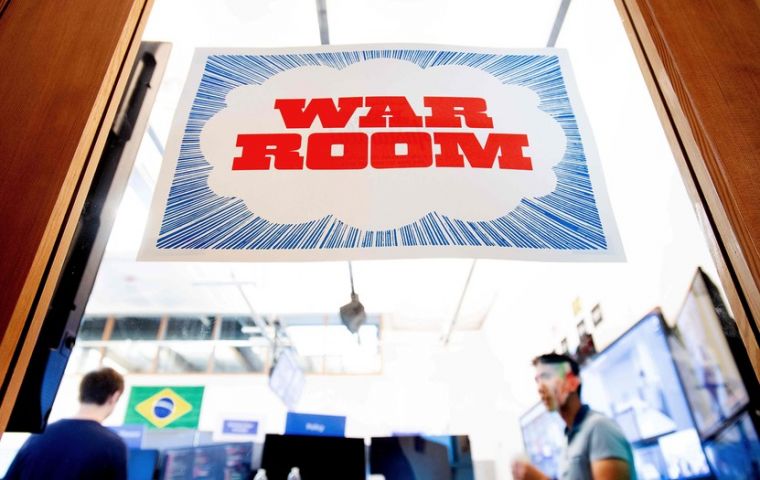MercoPress. South Atlantic News Agency
Facebook's “war room” to combat fake news ahead of Brazil and US elections
 From the outside, Facebook's war room looks like a typical conference room on the tech firm's Menlo Park, California, campus
From the outside, Facebook's war room looks like a typical conference room on the tech firm's Menlo Park, California, campus  Employees working face-to-face in Facebook's new “war room,” an operation the social media giant launched in September to stamp out fake news
Employees working face-to-face in Facebook's new “war room,” an operation the social media giant launched in September to stamp out fake news  “We know that when it comes to an election, really every moment counts,” said Samidh Chakrabarti, Facebook's director of elections and civic engagement work.
“We know that when it comes to an election, really every moment counts,” said Samidh Chakrabarti, Facebook's director of elections and civic engagement work. During the first round of Brazil's presidential election on 7 October, Facebook staff noticed something suspicious on the social network. A story posted to Facebook incorrectly claimed the election was delayed because of protests. The company's data scientists and operations team scrambled to pull down the misinformation before it went viral.
These employees were working face-to-face in Facebook's new “war room,” an operation the social media giant launched in September to stamp out fake news, disinformation and fake accounts in real time.
“We know that when it comes to an election, really every moment counts,” said Samidh Chakrabarti, Facebook's director of elections and civic engagement work.
As the clock winds down before the run-off elections in Brazil and the midterm elections in the US, Facebook is trying to prove to both the public and lawmakers that it's more prepared to combat election interference on its network. There's a lot at stake not only for democracy, but for Facebook, which has seen Russians, Iranians and Americans, too, exploit the social network to spread hoaxes and sow discord.
“You bear this responsibility. You've created these platforms. And now they are being misused. And you have to be the ones to do something about it. Or we will,” Senator Dianne Feinstein, a California Democrat, told Facebook, Twitter and Google lawyers last year during a congressional hearing about Russia's interference in the 2016 US presidential election.
While executives at the social media giant said it's moving swiftly, Facebook also has to balance concerns that it's censoring certain voices. The tech firm, which has tried to stay away from being the “arbiter of truth,” has been looking at the behavior of fake accounts instead of their content to decide whether to pull them down.
And with more than 2 billion monthly active users worldwide, Facebook is relying on both man and machine to police the large amounts of content that flows not only through its site but also through other apps it owns such as WhatsApp and Instagram.
But despite its efforts, other fake news stories tied to Brazil's presidential election still spread on Facebook and WhatsApp, highlighting the difficulties facing the world's largest social network. Last week, Brazil's electoral court ordered Facebook to pull down links to 33 fake news stories about vice presidential candidate Manuela D'Ávila.
“Facebook has a very tough challenge to be able to deal with the problem of on the one hand keeping false information out of the hands of voters who might be misled by it, but on the other hand protecting free speech where they're not seen as taking sides,” said Richard Hasen, a political science and law professor at UC Irvine.
From the outside, Facebook's war room looks like a typical conference room on the tech firm's Menlo Park, California, campus. But on the inside, the open space, flags, clocks, TV screens, posters and blue-and-white labels next to computer screens signal that it isn't your average meeting room.
A red-white-and-blue sign tacked onto the door gives the room its name. Next to the Brazilian and American flags, clocks displaying the times in both countries hang on the wall. Time is of the essence when it comes to the spread of misinformation, and Facebook thinks there's no substitute for face-to-face interaction.




Top Comments
Disclaimer & comment rulesCommenting for this story is now closed.
If you have a Facebook account, become a fan and comment on our Facebook Page!